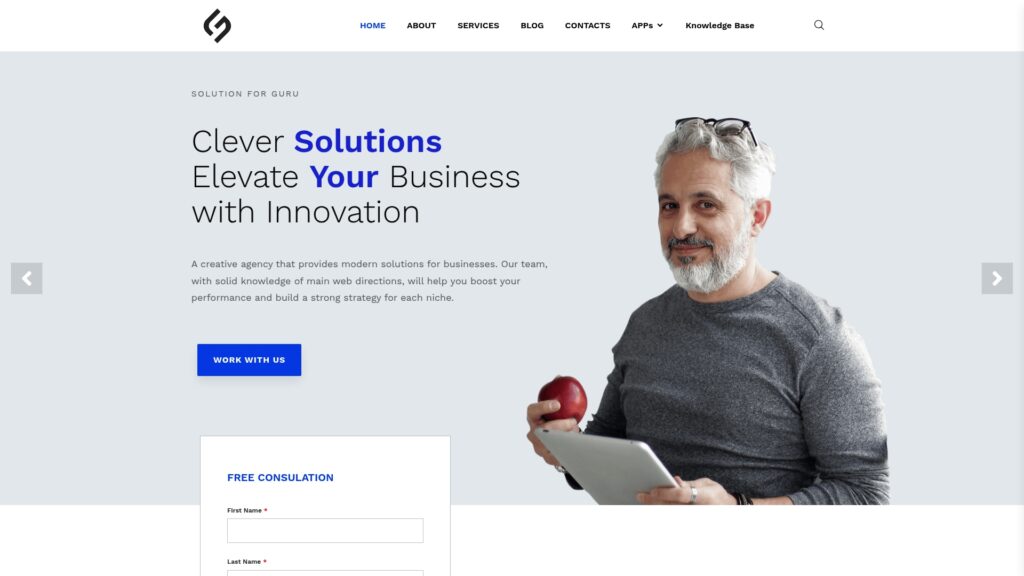CRM Management

In today’s competitive business landscape, effective customer relationship management (CRM) has become the cornerstone of sustainable growth and profitability. As businesses strive to build lasting relationships with their customers, CRM management emerges as a critical strategy that combines technology, processes, and people to deliver exceptional customer experiences while driving business success.
Table of Contents
- Quick Summary
- What is CRM Management
- Leading CRM Solutions Overview
- Core Components of CRM Management
- Implementation Strategies
- Best Practices for CRM Success
- Measuring CRM Performance
- Common Challenges and Solutions
- Future Trends in CRM Management
- Conclusion
- Frequently Asked Questions
- Benefits of Partnership with Solution4Guru
Quick Summary
CRM management represents a strategic approach to organizing, automating, and synchronizing business processes—principally sales activities, marketing efforts, customer service, and technical support. Furthermore, modern CRM systems like Creatio, Pipedrive, Zoho CRM, and Bigin by Zoho CRM provide businesses with powerful tools to enhance customer relationships, streamline operations, and boost revenue growth. Consequently, organizations that implement effective CRM management strategies experience improved customer satisfaction, increased sales productivity, and enhanced business intelligence capabilities.
What is CRM Management
Customer Relationship Management (CRM) management encompasses the comprehensive coordination of all customer-facing activities within an organization. Essentially, it involves the strategic use of technology, processes, and people to manage and analyze customer interactions throughout the entire customer lifecycle. Moreover, CRM management aims to improve business relationships, enhance customer retention, and ultimately drive sales growth.
At its core, CRM management serves multiple critical functions within an organization. Primarily, it centralizes customer data, making it accessible to all relevant departments. Additionally, it automates routine tasks, freeing up valuable time for relationship-building activities. Furthermore, it provides valuable insights through analytics and reporting, enabling data-driven decision-making.
The evolution of CRM management has transformed significantly over the past decades. Initially, businesses relied on simple contact management systems. However, today’s CRM management solutions integrate artificial intelligence, machine learning, and advanced analytics to provide predictive insights and personalized customer experiences.
| CRM Management Benefits | Impact on Business |
|---|---|
| Centralized Customer Data | Improved customer insights and personalized service |
| Automated Workflows | Increased efficiency and reduced manual errors |
| Enhanced Communication | Better team collaboration and customer engagement |
| Advanced Analytics | Data-driven decision making and strategy optimization |
| Mobile Accessibility | Improved productivity and real-time access to information |
Leading CRM Solutions Overview
Creatio: Low-Code CRM Platform

Creatio stands out as a revolutionary low-code platform that combines CRM management with business process management capabilities. Notably, this innovative solution empowers businesses to create custom applications and workflows without extensive coding knowledge. Consequently, Creatio enables organizations to adapt their CRM management processes quickly to changing business requirements.
The platform’s comprehensive approach to CRM management includes sales force automation, marketing automation, and customer service management. Additionally, Creatio‘s process-centric design allows businesses to model, execute, and optimize their customer-facing processes effectively. Furthermore, the platform’s visual development tools enable rapid customization and deployment of CRM solutions.
Key features that make Creatio exceptional for CRM management include its intelligent business process engine, advanced case management capabilities, and seamless integration options. Moreover, the platform’s AI-powered recommendations help sales teams prioritize opportunities and optimize their customer engagement strategies.
Pipedrive: Sales-Focused CRM

Pipedrive has established itself as a leader in sales-focused CRM management, particularly for small to medium-sized businesses. Specifically, this platform excels in pipeline management, providing intuitive visual representations of sales processes. Consequently, sales teams can easily track deal progress and identify bottlenecks in their sales cycles.
The platform’s approach to CRM management emphasizes simplicity and usability without sacrificing functionality. Additionally, Pipedrive offers robust automation features that help streamline repetitive tasks and ensure consistent follow-up with prospects. Furthermore, its comprehensive reporting capabilities provide valuable insights into sales performance and team productivity.
What sets Pipedrive apart in CRM management is its focus on actionable insights and goal tracking. Moreover, the platform’s mobile application ensures that sales professionals can manage their customer relationships effectively while on the go. Subsequently, this mobility enhances productivity and ensures no opportunities are missed.
Zoho CRM: Comprehensive Business Suite

Zoho CRM represents a comprehensive approach to customer relationship management within the broader Zoho ecosystem. Particularly, this platform excels in providing an integrated solution that connects CRM management with other business functions such as accounting, project management, and marketing automation. Consequently, businesses can achieve a unified view of their operations and customer interactions.
The platform’s strength in CRM management lies in its extensive customization options and workflow automation capabilities. Additionally, Zoho CRM offers advanced analytics and AI-powered features that help businesses predict customer behavior and optimize their engagement strategies. Furthermore, its multichannel communication features ensure consistent customer experiences across all touchpoints.
Zoho CRM‘s approach to CRM management is particularly beneficial for growing businesses that need scalable solutions. Moreover, the platform’s extensive integration capabilities with third-party applications make it an ideal choice for organizations with diverse technology stacks. Subsequently, this flexibility ensures that CRM management becomes a central hub for all customer-related activities.
Bigin by Zoho CRM: Small Business Solution

Bigin by Zoho CRM specifically addresses the CRM management needs of small businesses and startups. Importantly, this streamlined solution provides essential CRM functionality without the complexity often associated with enterprise-level platforms. Consequently, small business owners can implement effective CRM management strategies without significant time or resource investments.
The platform’s simplified approach to CRM management focuses on core features such as contact management, deal tracking, and basic automation. Additionally, Bigin offers intuitive reporting tools that help small businesses understand their customer relationships and sales performance. Furthermore, its affordable pricing model makes professional CRM management accessible to businesses with limited budgets.
What makes Bigin particularly effective for small business CRM management is its quick setup process and minimal learning curve. Moreover, the platform’s integration with other Zoho applications allows businesses to expand their capabilities as they grow. Subsequently, Bigin serves as an excellent entry point into comprehensive CRM management for emerging businesses.
Core Components of CRM Management
Effective CRM management relies on several interconnected components that work together to create a comprehensive customer relationship strategy. Primarily, contact management serves as the foundation, providing a centralized database of all customer information. Additionally, sales automation streamlines the sales process through automated workflows and pipeline management.
Marketing automation represents another crucial component of modern CRM management. Specifically, it enables businesses to nurture leads through personalized campaigns and targeted communications. Furthermore, customer service management ensures that all customer inquiries and issues are tracked, resolved, and analyzed for continuous improvement.
Analytics and reporting form the intelligence layer of CRM management systems. Consequently, these components provide insights into customer behavior, sales performance, and business trends. Moreover, integration capabilities ensure that CRM management systems work seamlessly with other business applications and data sources.
The following table illustrates the key components and their primary functions:
| Component | Primary Function | Business Impact |
|---|---|---|
| Contact Management | Centralize customer data and interaction history | Improved customer insights and personalized service |
| Sales Automation | Streamline sales processes and pipeline management | Increased sales productivity and conversion rates |
| Marketing Automation | Nurture leads through targeted campaigns | Enhanced lead quality and marketing ROI |
| Customer Service | Track and resolve customer issues efficiently | Improved customer satisfaction and retention |
| Analytics & Reporting | Provide insights into performance and trends | Data-driven decision making and strategy optimization |
| Integration Capabilities | Connect with other business systems | Unified business processes and data consistency |
Implementation Strategies
Successful CRM management implementation requires a strategic approach that considers organizational needs, resources, and objectives. Initially, businesses must conduct a thorough assessment of their current customer management processes and identify areas for improvement. Subsequently, this analysis helps determine the most suitable CRM platform and implementation approach.
Change management plays a crucial role in CRM management implementation success. Particularly, organizations must prepare their teams for new processes and technologies through comprehensive training programs. Additionally, clear communication about the benefits and expectations helps ensure user adoption and engagement.
Data migration represents one of the most critical aspects of CRM management implementation. Consequently, businesses must carefully plan and execute the transfer of existing customer data to the new system. Moreover, data cleansing and standardization activities ensure that the CRM management system starts with accurate and complete information.
The implementation process typically follows a phased approach to minimize disruption and maximize success. Furthermore, this strategy allows organizations to test and refine their CRM management processes before full deployment. Subsequently, lessons learned from early phases can be applied to improve later implementation stages.
Best Practices for CRM Success

Implementing best practices in CRM management significantly increases the likelihood of achieving desired outcomes. Primarily, organizations should focus on user adoption by ensuring that the CRM system is intuitive and provides clear value to end-users. Additionally, regular training and support help maintain high usage levels and system proficiency.
Data quality management represents another fundamental best practice in CRM management. Specifically, organizations must establish processes for maintaining accurate, complete, and up-to-date customer information. Furthermore, regular data audits and cleansing activities help prevent the accumulation of duplicate or outdated records.
Customization should be approached thoughtfully in CRM management implementations. Consequently, while platforms like Creatio, Pipedrive, Zoho CRM, and Bigin by Zoho CRM offer extensive customization options, organizations should balance customization with system simplicity. Moreover, excessive customization can lead to maintenance challenges and user confusion.
Regular performance monitoring and optimization ensure that CRM management systems continue to meet evolving business needs. Additionally, organizations should establish key performance indicators (KPIs) to measure CRM success and identify improvement opportunities. Furthermore, feedback from users helps guide system enhancements and process refinements.
Measuring CRM Performance
Effective measurement of CRM management performance requires a comprehensive approach that considers multiple dimensions of success. Primarily, organizations should track quantitative metrics such as sales conversion rates, customer acquisition costs, and customer lifetime value. Additionally, qualitative measures such as user satisfaction and system usability provide valuable insights into CRM effectiveness.
Sales performance metrics form the foundation of CRM management measurement. Specifically, organizations should monitor metrics such as pipeline velocity, deal closure rates, and sales cycle length. Furthermore, these metrics help identify bottlenecks and optimization opportunities within the sales process.
Customer satisfaction and retention metrics provide insights into the effectiveness of CRM management strategies. Consequently, measurements such as Net Promoter Score (NPS), customer churn rate, and support ticket resolution times help assess customer relationship quality. Moreover, these metrics often correlate directly with revenue growth and business success.
The following performance measurement framework provides a comprehensive approach:
| Metric Category | Key Measurements | Success Indicators |
|---|---|---|
| Sales Performance | Conversion rates, pipeline velocity, deal size | Increased revenue and shorter sales cycles |
| Customer Satisfaction | NPS scores, retention rates, support metrics | Higher customer loyalty and reduced churn |
| System Adoption | User login frequency, feature utilization | High engagement and system dependency |
| Data Quality | Completeness, accuracy, duplicate rates | Clean, reliable customer information |
| ROI Metrics | Cost per acquisition, lifetime value | Positive return on CRM investment |
Common Challenges and Solutions
CRM management implementation and operation often encounter various challenges that can impact success. Primarily, user adoption resistance represents one of the most common obstacles, particularly when employees are comfortable with existing processes. Additionally, poor data quality can undermine CRM effectiveness and lead to frustrated users and inaccurate insights.
Integration challenges frequently arise when CRM management systems need to connect with existing business applications. Specifically, data synchronization issues and workflow disruptions can impact productivity and user satisfaction. Furthermore, inadequate customization or over-customization can create usability problems and maintenance burdens.
Training and support deficiencies often contribute to CRM management failures. Consequently, organizations must invest in comprehensive training programs that address both technical skills and process changes. Moreover, ongoing support ensures that users can maximize system capabilities and resolve issues quickly.
Solutions to these challenges often involve strategic planning and resource allocation. Additionally, platforms like Creatio, Pipedrive, Zoho CRM, and Bigin by Zoho CRM offer various tools and features designed to address common implementation obstacles. Furthermore, partnering with experienced implementation specialists can help organizations navigate complex challenges and achieve successful outcomes.
Future Trends in CRM Management

The future of CRM management is being shaped by several emerging trends and technologies. Primarily, artificial intelligence and machine learning are revolutionizing how businesses analyze customer data and predict behavior. Additionally, these technologies enable more personalized customer experiences and automated decision-making processes.
Mobile-first design is becoming increasingly important in CRM management as field sales teams and remote workers require full functionality on mobile devices. Consequently, CRM platforms are prioritizing mobile optimization and developing native applications with comprehensive capabilities. Furthermore, voice interfaces and conversational AI are beginning to transform how users interact with CRM systems.
Social CRM integration represents another significant trend in customer relationship management. Specifically, businesses are incorporating social media data and interactions into their CRM management strategies. Moreover, this integration provides a more complete view of customer preferences and behaviors across all communication channels.
The rise of customer data platforms (CDPs) is influencing CRM management by providing unified customer profiles from multiple data sources. Subsequently, this trend enables more sophisticated segmentation and personalization strategies. Additionally, privacy regulations and data security concerns are driving innovations in secure data management and customer consent handling.
Let’s summarize
CRM management represents a fundamental business capability that directly impacts customer satisfaction, sales performance, and organizational growth. Throughout this comprehensive guide, we have explored how modern CRM platforms like Creatio, Pipedrive, Zoho CRM, and Bigin by Zoho CRM provide businesses with powerful tools to enhance their customer relationships and operational efficiency.
The success of CRM management initiatives depends largely on strategic planning, proper implementation, and ongoing optimization. Moreover, organizations that invest in comprehensive CRM management strategies often experience significant improvements in customer retention, sales productivity, and business intelligence capabilities. Furthermore, the continuous evolution of CRM technology ensures that businesses have access to increasingly sophisticated tools for managing customer relationships.
As businesses continue to navigate competitive markets, effective CRM management becomes increasingly critical for sustainable success. Consequently, organizations must carefully evaluate their CRM management needs and select platforms that align with their strategic objectives. Additionally, the integration capabilities of solutions like Creatio, Pipedrive, Zoho CRM, and Bigin by Zoho CRM ensure that businesses can create comprehensive customer management ecosystems.
The future of CRM management promises even greater integration of artificial intelligence, enhanced mobile capabilities, and more sophisticated analytics. Subsequently, businesses that establish strong CRM management foundations today will be better positioned to leverage these emerging technologies and maintain competitive advantages in their respective markets.
Frequently Asked Questions
The primary differences lie in their target markets and feature complexity. Creatio offers a low-code platform ideal for businesses requiring extensive customization and process automation. Pipedrive focuses specifically on sales pipeline management with intuitive visual interfaces. Zoho CRM provides comprehensive functionality within a broader business suite, while Bigin by Zoho CRM offers simplified features specifically designed for small businesses and startups.
CRM management implementation timelines vary significantly based on system complexity and organizational requirements. Generally, simple implementations using platforms like Bigin by Zoho CRM can be completed within 2-4 weeks. However, more complex implementations involving Creatio, Pipedrive, or Zoho CRM may require 3-6 months, particularly when extensive customization and data migration are involved.
Key considerations include business size, industry requirements, budget constraints, integration needs, and growth projections. Additionally, organizations should evaluate user experience, customization capabilities, mobile accessibility, and vendor support quality. Furthermore, the availability of specific features such as automation, analytics, and reporting should align with business objectives and operational requirements.
Benefits of Partnership with Solution4Guru
Partnering with Solution for Guru (https://www.solution4guru.com/) provides businesses with expert guidance and support throughout their CRM management journey. Specifically, their experienced team offers comprehensive consulting services that help organizations select, implement, and optimize CRM solutions including Creatio, Pipedrive, Zoho CRM, and Bigin by Zoho CRM.

The company’s expertise spans multiple CRM platforms, enabling them to provide objective recommendations based on specific business needs rather than vendor preferences. Furthermore, Solution for Guru‘s proven methodologies help accelerate implementation timelines while maintaining high quality standards and user satisfaction levels.



